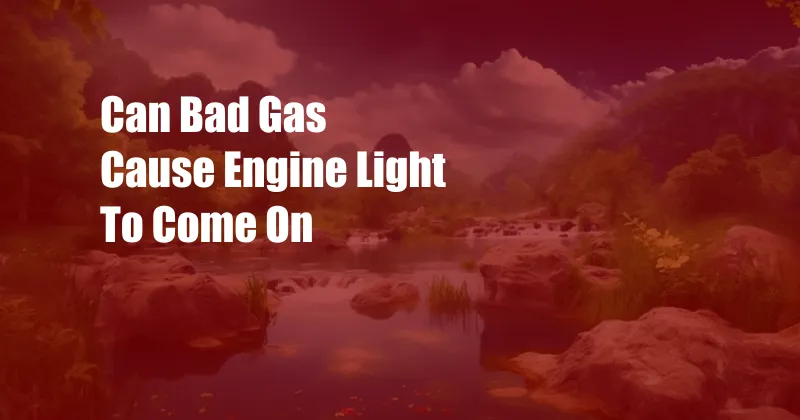
Can Bad Gas Cause Engine Light to Come On?
As a seasoned motorist, I’ve had my fair share of car troubles. One that always leaves me perplexed is the dreaded engine light illumination. It’s like a cryptic message from your car, hinting at an underlying issue that could range from minor to catastrophic. One such instance occurred during a road trip, when my car suddenly began to sputter and shake, accompanied by the ominous glow of the engine light. I pulled over to the side of the road, heart pounding with worry. After some troubleshooting, I realized I had made a rookie mistake: filling up with bad gas.
Bad Gas: A Culprit of Engine Woes
Bad gas refers to gasoline that contains impurities, such as water, dirt, or other contaminants. It can be caused by various factors, including poor storage practices at gas stations, water condensation in underground tanks, or accidental contamination during transportation. When used in your vehicle, bad gas can wreak havoc on your engine, leading to a host of problems.
Engine Light Activation
One of the most common consequences of bad gas is the activation of your car’s engine light. This light is designed to alert you to any potential issues with your engine’s performance, including those caused by bad gas. Contaminants in bad gas can clog fuel filters, foul spark plugs, or damage fuel injectors, leading to engine misfires, reduced power, and other performance problems.
Diagnostics and Troubleshooting
If your engine light comes on after refueling, it’s crucial to have your car diagnosed by a qualified mechanic. They will inspect your fuel system, including the fuel filter, spark plugs, and fuel injectors, for signs of contamination or damage. If bad gas is determined to be the culprit, the mechanic will typically drain and replace the contaminated fuel and perform necessary repairs to address any underlying issues.
Tips for Avoiding Bad Gas
To minimize the risk of encountering bad gas, follow these expert tips:
- Choose reputable gas stations with well-maintained facilities and a history of reliable fuel quality.
- Avoid filling up at stations with extremely low prices, as they may have compromised fuel sources.
- If you suspect bad gas, don’t drive your car. Instead, contact a tow truck to safely transport it to a mechanic.
Additional Precautions
In addition to preventing bad gas, there are other measures you can take to prolong the life of your engine and avoid costly repairs:
- Use high-quality gasoline with the recommended octane rating for your vehicle.
- Avoid letting your fuel tank run too low, as this can lead to condensation and contamination.
- Regularly service your vehicle, including replacing fuel filters and spark plugs as recommended by the manufacturer.
Frequently Asked Questions
Q: Can bad gas damage my engine permanently?
A: It depends on the severity of the contamination and the extent of damage caused before the problem is addressed. If bad gas is detected and dealt with promptly, the damage can be minimized.
Q: Should I use fuel additives to prevent bad gas?
A: While fuel additives may help maintain fuel quality, they are not a substitute for good fueling practices and regular vehicle maintenance. It’s always best to use high-quality gasoline and avoid filling up at questionable gas stations.
Conclusion
Understanding the potential consequences of bad gas and taking proactive measures to avoid it can save you costly repairs and headaches down the road. By choosing reputable gas stations, filling up your tank regularly, and servicing your vehicle as recommended, you can help ensure your car’s engine runs smoothly and efficiently for years to come.
Would you like to learn more about bad gas and its effects on your vehicle? Join our online forum for discussions, tips, and the latest automotive news.